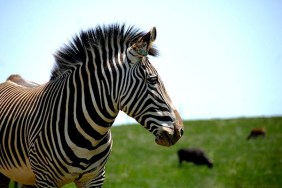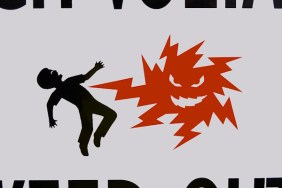No matter how hard we may try with camouflage-print fabrics, we humans have nothing on Mother Nature when it comes to blending in with our environments. These 10 amazing geckos, moths, butterflies, owls and frogs are virtually undetectable against tree bark, branches, leaves and moss thanks to amazingly accurate natural camouflage.
Satanic Leaf-Tailed Gecko
The colorfully named Satanic Leaf-Tailed Gecko might look a little menacing with its red eyes and sinister smile – if you even notice it in the first place, given its incredible camouflage. Native to Madagascar, the gecko has a flattened tail that perfectly mimics a decaying leaf. Destruction of its habitat and collection for the pet trade threaten this highly unusual creature, which uses its ability to blend into the forest more to capture prey than to evade predators.
Dead Leaf Butterfly
Look at the front side of the Kallima inachus butterfly and you'll see a beautiful pattern of yellow, black and blue coloration. But when the butterfly closes its wings, the reason for its nickname 'Dead Leaf Butterfly' becomes immediately apparent.
Titan Stick Insect
Imagine picking up a stick and then realizing it has legs. The Titan Stick Insect is one of the world's longest, reaching lengths up to twelve inches, and is virtually undetectable when it's perched on a tree. When they move, they even mimic the look of twigs swaying in the wind. They're found in the eastern coastal areas of Australia.
Eastern Screech Owl
We're none the wiser when passing Eastern Screech Owls perched in trees, not just because they're nocturnal, but because they blend in so seamlessly. These small masters of disguise vary in coloration depending on the area of the country in which they live, seeming to become a part of the tree bark that houses them. Check out a photo on The Huffington Post to see just how hard to spot they can be.
Orache Moth
It's not just the colors on the wings of the orache moth that enable it to hide so well on tree branches, but texture as well. This little moth's body and wings are covered in green spots that make it incredibly adept at mimicking moss.
Mossy Leaf-Tailed Gecko
Good luck spotting the Mossy Leaf-Tailed Gecko when it's perched on a branch. Not only does this reptile have the ability to change its skin color to match the background of wherever they're hiding, they also have 'dermal flaps' that make the outline of their bodies very hard to distinguish from the surface of a tree. Like so many other fascinating and exotic creatures, it's endemic to Madagascar.
Phylliidae
The entire family of Phylliidae insects is known as 'walking leaves.' The various species within this family have different shapes and coloration depending on their particular environments, but all of them look exactly like leaves and walk in such a way that they look like they're simply being blown in the wind. They're found all over South and Southeast Asia as well as Australia.
Moss Stick Mimic
The amazingly well-camouflaged moss stick mimic looks like a bit of moss and lichen grew legs and started to walk. It's found in the rainforests of Costa Rica.
Vietnamese Mossy Frog
This northern Vietnamese frog has evolved to look exactly like a moist patch of moss between rocks in its subtropical and tropical forest environment. Threatened by habitat loss, the semi-aquatic species curls into a ball and plays dead when frightened.
Common Baron Caterpillar
When fully mature, the female of the Common Baron Caterpillar species is extraordinary for its beautiful pale green coloration, which makes it look more like a butterfly. But perhaps more interesting is the larval stage of this species native to India and Southeast Asia. The caterpillar has fuzzy green legs that virtually disappear into the veins of a leaf on its preferred home of a mango tree.






